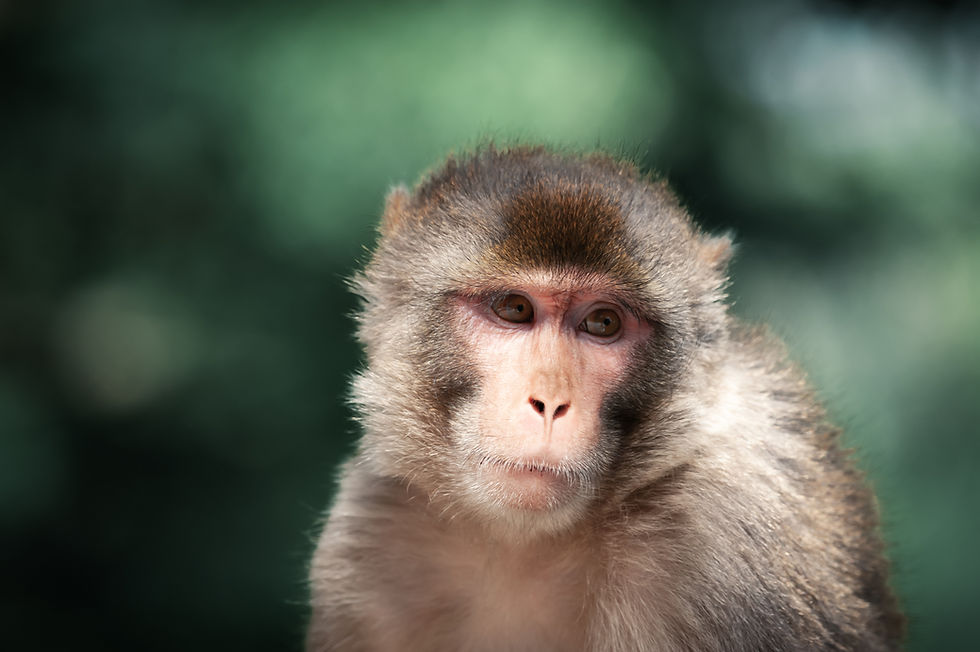No, You Can’t Have a Chimp as a Pet – And Here’s Why
- vuciwebsite
- Jun 12, 2025
- 3 min read
Chimpanzees are not pets. They are intelligent, wild, and endangered animals whose lives are often destroyed by human exploitation. Yet, social media continues to glamorize chimps dressed in clothes, eating ice cream, or riding in cars—as if they were toys or human babies. Behind every such image is a story of suffering, risk, and often, crime.
Let’s break down why keeping a chimpanzee as a pet—or parading it in public—is deeply irresponsible and illegal in Malta.

⚠️ The Hidden Dangers
Chimpanzees may start off small and seemingly manageable, but they grow quickly. By age 5, they are stronger than most adult humans. By the time they reach sexual maturity—around 8 to 11 years old—they become unpredictable, dominant, and potentially violent.
There have been dozens of serious chimpanzee attacks documented globally, especially involving captive chimps kept as pets or in private facilities—but many cases go unreported or are covered up to avoid public backlash or legal consequences.
Here are a few notable and confirmed examples:
Travis the Chimp (USA, 2009):
A 14-year-old male chimpanzee attacked a woman named Charla Nash.
He ripped off her face, hands, nose, lips, and eyelids.
Nash survived after multiple surgeries, including a face and hand transplant.
The chimp was shot and killed by police.
St. James Davis (USA, 2005):
Attacked while visiting a chimpanzee at a sanctuary.
Two chimps escaped and bit off parts of his face, fingers, buttocks, and genitals.
He survived but with permanent disfigurement and disabilities.
Tonka and Other Film Chimps (Various):
Chimps used in entertainment have been involved in multiple attacks on handlers, producers, and guests—especially as they age into adolescence and adulthood.
🧠 Emotional and Psychological Harm
Chimpanzees are social, emotional beings with complex mental needs. They thrive in tight-knit groups in the wild, not alone in human homes or cages. Taking them for car rides, dressing them up, or exposing them to crowds causes intense stress, confusion, and trauma. These are not “fun outings” for the animal—they’re moments of psychological harm disguised as entertainment.
💔 Misguided Love Isn’t Harmless
And while it may seem that the owner “loves” the chimp and provides it with care, true love means respecting the animal’s nature—not controlling or domesticating it. Dressing a chimpanzee in clothes, parading it in public, or feeding it ice cream may come from a place of affection, but it’s ultimately a form of misguided love that causes harm.
Wild animals have wild needs. No amount of affection can replace the natural environment, social structure, and freedom that chimpanzees require to live healthy, fulfilled lives. What feels like love to a human can be stress, deprivation, and confusion for the animal.
🔒 The Law in Malta: No Chimps as Pets
In Malta, keeping a chimpanzee as a pet is strictly illegal.
Chimpanzees are protected under:
CITES Appendix I, which prohibits commercial trade in endangered species.
Maltese national law, including the Keeping of Wild Animals Regulations (S.L. 439.08) and animal welfare acts.
Only licensed zoos or sanctuaries—under very specific conditions—can legally house chimpanzees. And even then, the animal cannot be taken into public spaces. Taking a chimp for a ride in a car, or allowing people to interact with it, is a clear breach of legal and welfare obligations.
Violations can lead to:
Criminal charges
Seizure of the animal
Heavy fines and legal action
🌍 The Illegal Wildlife Trade: Where These Chimps Come From
Most chimps kept as pets or in private facilities come from the illegal wildlife trade. Baby chimps are typically taken after poachers kill their mothers and other members of the troop. It’s estimated that up to 10 chimps die for every one baby captured alive.
These animals are smuggled across borders, sold on the black market, and passed around by people who claim to “love animals” while profiting off their exploitation.
🚫 No Excuse for Cruelty
Dressing a chimp in clothes, feeding it ice cream, or taking it out for public attention is not love—it’s exploitation. These actions fuel misinformation, reinforce dangerous myths about exotic pets, and keep the illegal trade alive.
Chimpanzees deserve to live in peace, in the wild or in sanctuaries where their needs come first—not as sideshows for human amusement.
✅ What You Can Do
Speak out when you see chimps or other exotic animals used as entertainment props.
Report illegal activity to authorities or animal welfare organisations.
Educate others about the true cost of keeping wild animals as pets.
Let’s stop normalising the captivity and exploitation of wild animals—and start treating them with the respect and protection they deserve.




Comments